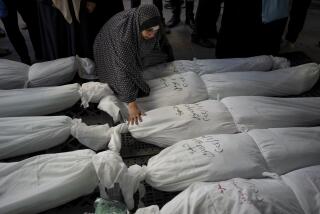Cheney presses Mideast accord
- Share via
JERUSALEM — Declaring that an independent Palestinian state was “long overdue,” Vice President Dick Cheney said on Sunday that the success of the U.S.-sponsored peace negotiations depends on the Palestinian ability to rein in militant groups that favor armed resistance over negotiations.
“Terror and rockets do not merely kill civilians, they also kill the legitimate hopes and aspirations of the Palestinian people,” Cheney said after meeting with Palestinian Authority President Mahmoud Abbas in the West Bank city of Ramallah. “The future belongs to the advocates of peace and reconciliation.”
Abbas is largely unable to limit the activities of the largest Palestinian militant group, Hamas. After a unity government between Hamas and Abbas’ Fatah party collapsed in June, Hamas gunmen drove Fatah forces out of the Gaza Strip, leaving Abbas in control of only the West Bank.
Efforts to reconcile the warring Palestinian factions continued Sunday in Yemen, with both sides agreeing only to continue talking.
Abbas, after meeting with Cheney, said that Israeli actions in both the West Bank and Gaza were undermining Palestinian faith in a negotiated settlement with Israel.
“Peace and stability will not be achieved through settlement expansion, or the setting up of checkpoints around towns and villages, and the military escalation against Gaza,” he said.
He condemned the rocket attacks that Hamas and other militant groups regularly launch from Gaza at southern Israeli cities and towns, but expressed hope that a fair, negotiated settlement would cripple support for Hamas.
“If this peace is established, then its first results would be to weaken the extremist forces and the creation of a regional environment for cooperation and good neighborly relations,” Abbas said. “What is required is goodwill and the courage, and strong support from the international community, particularly the United States of America.”
Cheney arrived in Jerusalem on Saturday as part of a regional tour that included stops in Afghanistan and the Persian Gulf. While thousands of Christian pilgrims flooded Jerusalem and Bethlehem for Easter services, Cheney and his family celebrated Mass with Lazarist monks at a small chapel attached to the U.S. Consulate in West Jerusalem.
At the Church of the Holy Sepulcher, believed to be the site of Jesus’ crucifixion, burial and resurrection, Archbishop Michel Sabbah turned his sermon into an appeal for an end to Israeli-Palestinian bloodshed.
The conflict has turned the Holy Land into “a permanent cross, a place of blood and hate,” said Sabbah, a Palestinian who is the top Roman Catholic authority in Jerusalem.
“To believe Jesus rose from the dead is to believe and hope that this land can also resurrect, provided that minds and hearts are purified of the evil of war, hostility and the distrust that are deeply ingrained in it,” Sabbah said.
In Sana, the Yemeni capital, negotiators for Fatah and Hamas announced the signing of a declaration of intent to “resume dialogue between the two movements to return the Palestinian situation to what it was” before Hamas’ Gaza takeover.
Abbas has said that true reconciliation talks won’t begin until Hamas renounces control of the Gaza Strip.
--
Times staff writers Richard Boudreaux in Jerusalem and James Gerstenzang in Washington contributed to this report.
More to Read
Sign up for Essential California
The most important California stories and recommendations in your inbox every morning.
You may occasionally receive promotional content from the Los Angeles Times.













